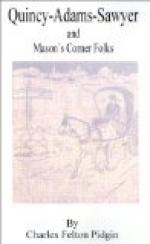“I am glad to hear you say that, Quincy,” said his father, somewhat mollified, and he edged his arm-chair a little closer to his son, despite the heavy clouds of smoke emitted from Quincy’s cigar. “If you get the regular nomination in our district it’s tantamount to an election. I need scarcely say that whatever influence I may possess will be exerted in your favor.”
“Thank you,” said Quincy; “I mean to stump the district, anyway. If I lose the regular nomination I shall take an independent one. I had rather fight my way in than be pushed in.”
His father smiled and patted him on the arm. Then they rose from their chairs, Quincy observing that as he was going away early in the morning he would immediately retire.
“That reminds me,” said his father. “I have a favor to ask of you, Quincy. It is this, Lord Algernon Hastings, heir to the earldom of Sussex, and his sister, Lady Elfrida, are now in Boston, and bring letters from the Lord High Chancellor, with whom I became acquainted when I was in England, two years ago. I have invited them to visit us here next week, and my wish is that you will spend as much of your time at home as possible and assist me in entertaining them—I mean the son, of course, particularly.”
Quincy’s thoughts flew quickly to Nantucket and back. Had he foreseen what was to happen on his coming visit, he would have hesitated still longer, but thinking that, after all, next Sunday’s journey might not end any more conclusively than the previous one, he presently turned to his father and answered:
“I will do so. I must go to-morrow, but I will return early on Monday, and will stay at home the entire week.”
“I thank you very much, Quincy,” said the Hon. Nathaniel, and he laid his hand on his son’s shoulder as affectionately as he was capable of doing, when they entered the house.
Lady Elfrida Hastings and her brother, Lord Algernon, arrived in due season, and Quincy was there to assist at their reception. The former was tall, and dark, and stately; her features were cast in a classic mould, but the look in her eye was cold and distant, and the face, though having all the requirements of beauty, yet lacked it. To Mrs. Sawyer and her daughter, Florence, the Lady Elfrida was a revelation, and they yearned to acquire that statuesque repose that comes so natural to the daughter of an earl. But Maude told her brother that evening that the Lady Elfrida was a “prunes and prisms,” and was sure to die an old maid.
Lord Algernon was tall and finely built; he had a profusion of light brown curly hair, and a pair of large blue eyes that so reminded Quincy of Alice that he took to the young lord at once. They rode, played billiards, bowled, and smoked together.
One afternoon while they were enjoying a sail in the bay, Quincy inquired of his guest how he liked America.
“’Pon honor, my dear fellow, I don’t know,” replied Lord Algernon. “I came here for a certain purpose, and have failed miserably. I am going to sail for home in a week, if my sister will go.”




